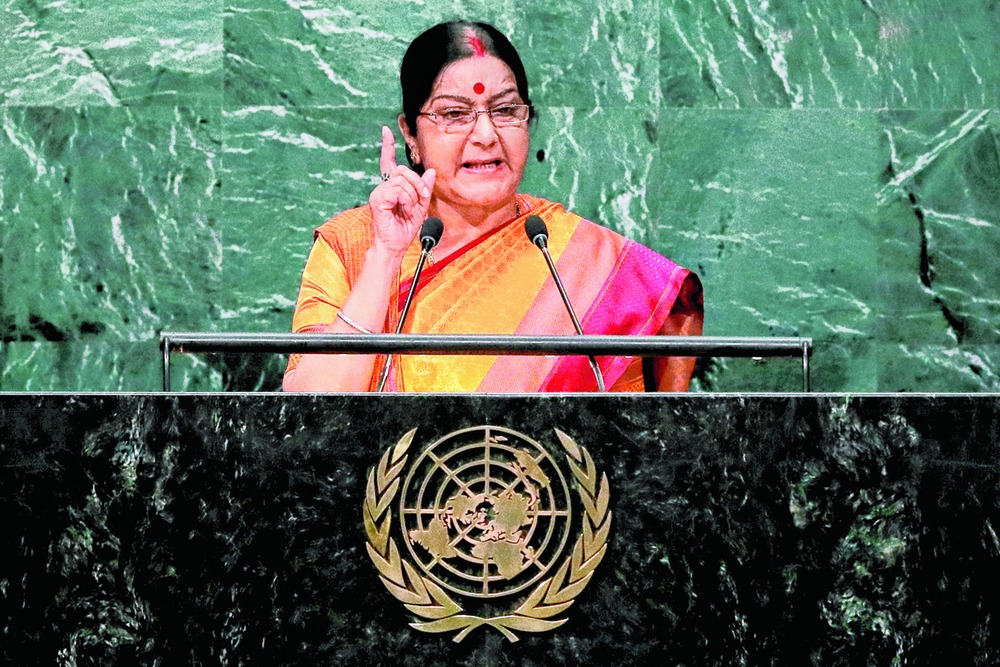
New Delhi, Sept. 26: Foreign minister Sushma Swaraj today demanded a global boycott of Pakistan over terrorism in an address at the UN where she tried to highlight differences between the neighbours while rejecting allegations Pakistan's Prime Minister had levelled against India last week.
Sushma's speech at the UN General Assembly, touted over the past week by the Narendra Modi government as India's response to charges levelled by Nawaz Sharif, did not forward new arguments, issue new warnings or reveal fresh information to pressure Islamabad.
But by sharply iterating India's concerns without resorting to any threats - while also shining a light on New Delhi's contributions towards global goals like combating climate change - Sushma had aimed to draw a stark contrast between the South Asian nations, officials here said.
Despite that contrast, the officials conceded, the success of Indian attempts to isolate Pakistan remains unclear.
Although India has won support from many major nations over the Uri terror attack in which 18 soldiers were killed on September 18, most of them also remain concerned about an escalation of tensions in South Asia.
Anti-terror drills that Russia, India's all-weather friend, began last week with Pakistan and Washington's reluctance to give up on Islamabad have only added to New Delhi's challenges.
Sushma's address today was an admission of this challenge - and an attempt to address it, officials familiar with the thinking behind the speech told this newspaper.
"If we want to defeat terrorism, there is only one way - that we unite across our differences, add steel to our resolve and inject urgency in our response," Sushma said. "We need to forget our prejudices and join hands together to script an effective strategy against terror."
To try and build that consensus, Sushma spent a fifth of her speech cautioning the world about the menace of terrorism - without mentioning Pakistan and by highlighting other terror attacks that have greater recall in the international community.
She started by referencing the recent bomb explosions in New York City and the September 11, 2001, attacks. "This month marked the 15th anniversary of the 9/11 attacks on this city," Sushma said. "Tragically, less than 15 days ago, another attempt at killing innocents was made through an act of terror in this same city. We, who have suffered in Uri recently, understand the pain inflicted by the same forces."
She then mentioned a series of terror attacks the world has witnessed over the past year - in Paris, Kabul, Dhaka, Istanbul, Mogadishu, Brussels, Bangkok and Pathankot - and referred to the "daily barbaric tragedies" committed by the Islamic State in Syria and Iraq.
Sushma then argued that it would be impossible to defeat terrorism "by making specious distinctions between your problems and mine, between terrorists who attack you and those who attack me".
Only then did Sushma begin a direct attack on Pakistan, starting with a reference to Sharif's description of Hizbul Mujahideen militant Burhan Wani as a "young leader murdered" by India in his address to the UNGA on September 21.
"In our midst, there are nations that still speak the language of terrorism, that nurture it, peddle it, and export it," the foreign minister said, speaking in Hindi. "To shelter terrorists has become their calling card. We must identify these nations and hold them to account."
Calling "these nations" - that allow UN-declared terrorists to roam freely and deliver sermons without restrictions - as guilty of terrorism as the militants themselves, Sushma insisted that "such nations should have no place in the comity of nations".
Sharif, in his address to the UNGA, had accused India of human rights abuses in Kashmir, where over 80 people have died in clashes between security forces and protesters since Wani's killing in July.
Today, Sushma asked Pakistan to "introspect" about its own human rights record, "including in Balochistan".
"The brutality against the Baloch people represents the worst form of state oppression," she said.
Sushma also challenged Sharif's assertion last week that India had placed "unacceptable conditions" for talks with Pakistan, referring to the invitation to the Pakistan Prime Minister to attend Modi's oath-taking ceremony in 2014, her own visit to Islamabad and Modi's short trip to Lahore last December.
"What pre-conditions?" she asked. "We took the initiative to resolve issues not on the basis of conditions, but on the basis of friendship."
She claimed the Modi government - through Id greetings, wishes for the Pakistan team ahead of the 2015 cricket World Cup and concern when Sharif was recovering from a heart operation in June - had gone beyond any previous Indian government in reaching out to Islamabad.
"And what did we get in return?" she asked aloud, before referring to recent terror attacks and the July arrest of a Pakistani terrorist in Kashmir. "Pathankot, Bahadur Ali and Uri."
Earlier, Sushma tried to highlight India's role in helping the world combat climate change, citing Modi's announcement yesterday that India would submit its ratification of last year's Paris agreement on October 2.
"The 21st century has begun in the shadow of turmoil, but we can turn this into a golden age of civilisation through united and concerted efforts," Sushma said. "But what happens tomorrow will depend on what we do today."











